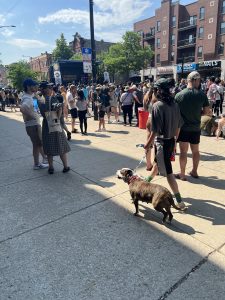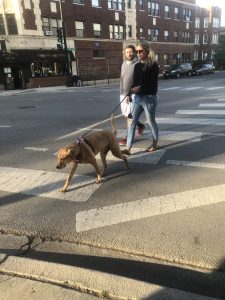The Chicago personal injury attorneys at Zneimer & Zneimer often meet with people who had suffered severe dog bite injuries from a dog that lives in a rental place. Many times a dog had jumped over a low fence or squeezed through a broken door and attacked a passerby. Although blameless for the dog attack, injury victims often find themselves dealing with a dog owner who has neither insurance nor money to pay for the injured person’s mountain of medical bills, disfigurement, pain, lost wages. In our experience it is rare for a renter to have liability insurance, and most renters do not enjoy wealth sufficient enough to compensate their dog’s victim.
The question then is whether a landlord, a roommate, a property manager can be held responsible when a renter’s dog jumps onto the street because the property was insufficiently secure. Their liability will depend on the facts.
The Animal Care Act imposes penalties against both the owner of the animal and anyone who places themselves in a position of control akin to an owner. Under Illinois law merely permitting a dog to be on the rented property is insufficient to establish ownership pursuant to the Act. If a landlord, a roommate, or a property manager cares for the dog, feeds the dog, or otherwise controls the dog at the time of the attack, it is possible to attach liability to them as “owners” under the definition of the Act and reach any insurance they have. They must be harboring or keeping the animal, which amounts to undertaking to manage, control, or care for the dog as dog owners, in general, are accustomed to doing. Therefore, it is very important to document the instances when third parties cared for the dog because such instances may provide enough support to attach liability. However, if they cannot be held as owners, they cannot be held responsible under the Animal Care Act.
Can they be held liable under a negligence theory if they knew that the dog lived on the property if they knew that the fence was too low or the door insecure, and they had a duty to maintain their property in a reasonably safe condition? The answer again depends on the facts. When a negligence claim involves a dog against someone other than the dog’s owner, the injured victim must demonstrate that the landlord, property manager, or any other party with duty to maintain their property reasonably safe, had prior knowledge of the dog’s viciousness. Tyrka v. Glenview Ridge Condominium Ass’n, 2014 IL App (1st) 132762, ¶ 52. Factual investigation is again crucial to prove negligence: was there a warning sign about a dangerous dog? Did the landlord come to collect the rent in person? Did the landlord know that the dog had attacked before? The entire case may hinge on how these questions are answered. It does not matter that the landlord or property manager knew that the fence was too low or the door broken. The question is whether they knew that the renter’s dog on their premises had vicious propensities. Thus, regardless of the condition of the door or the fence, and regardless of the landlord’s duty to repair it, liability may only be imposed if the landlord or property manager knew of the renter’s dog’s dangerousness.
Because recovery depends on meticulous factual investigation, retaining an attorney as soon as possible can make a difference between holding a culpable party responsible or holding a stack of unpaid medical bills. If you have been injured by a dog bite, call the Chicago dog bite attorneys of Zneimer & Zneimer. We love animals but hold irresponsible parties to account.
 Chicago Accident Lawyer Blog
Chicago Accident Lawyer Blog




